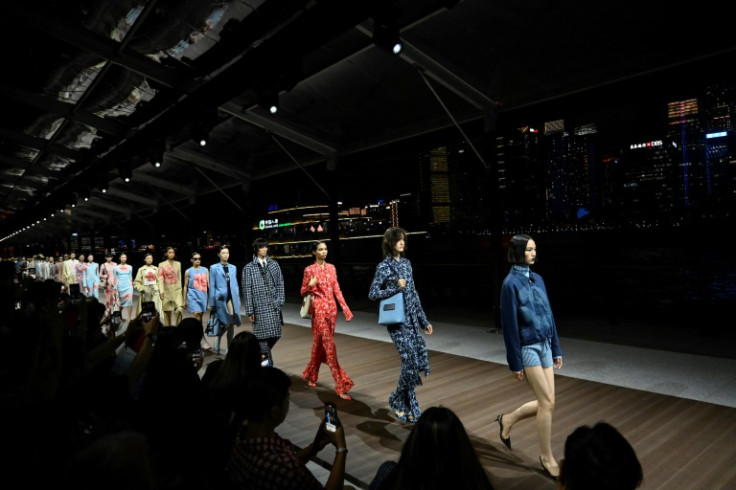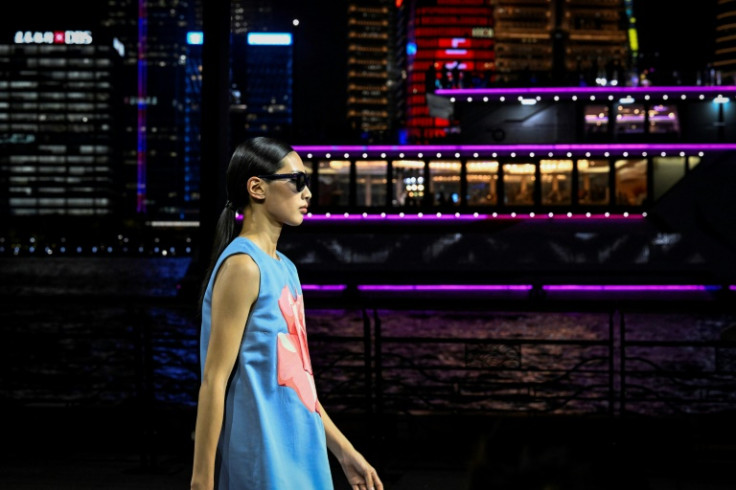Kenzo Presents First Fashion Show In China

Against Shanghai's glittering river skyline, Kenzo-clad models strutted down a breezy open-air runway on Friday for the French fashion brand's first-ever show in China.
The country's vast pool of consumers is critical to the luxury market, and top brands like Kenzo are turning to wooing them on their own turf as domestic high-end shopping rises.
Kenzo already operates 40 stores in mainland China, and the show is part of its policy of "reinforcing its strong commitment and growing presence in the Chinese market", a statement announcing the show said.
"Despite the slowing economy, China is sending positive signs (to design houses)," said Lisa Nan, correspondent for Jing Daily, a publication which reports on the luxury sector in the country.
Consequently, "brands are engaging with local consumers through their highest standard of presentation, runways... Consumers really appreciate these exclusive events".
On Friday, dozens of models in dark blues and pastels paraded down the riverfront catwalk that took Shanghai's Oriental Pearl Tower as a backdrop, with bemused tourists scrambling to take pictures as they sailed past on LED-lit cruise boats.
Creative director Nigo's Spring/Summer 2024 collection -- which has already shown in Paris -- was presented with small changes to underscore "a symbolic yet natural 'East Meets West' bridge", Kenzo said.
The Shanghai venue was chosen to match that of the Paris show, which took place on the footbridge that links to the Eiffel Tower over the River Seine in June.
Kenzo is part of the LVMH group, which includes dozens of brands like Louis Vuitton, Dior and Tiffany.
Its head, French billionaire Bernard Arnault, visited China in late June and has said he is "optimistic about the Chinese market".
"The Chinese clientele is much more important than it was in 2019," LVMH's financial director Jean-Jacques Guiony recently told journalists.
Analysts at UBS, meanwhile, have said that 2023 will be the "year of the Chinese consumer".
Chinese consumers' spending on personal luxury goods had already surpassed pre-pandemic levels by the end of 2022 and has continued to grow year-on year, according to market research company Euromonitor -- largely thanks to domestic shopping that took off while zero-Covid kept the country largely cut off from the world.
The figure is projected to reach US$59 billion by 2023, with the growth set to continue, although at a slower rate, in the short to medium term.
"Post-pandemic repatriation of luxury spending is unlikely to budge any time soon," said Fflur Roberts, Head of Luxury Goods at Euromonitor.
"These new-found shopping habits and major improvements in the local shopping options and customer journey are set to stick, and a notable share of luxury purchases by Chinese customers will continue to occur within the mainland."
Despite China's slowing economy, Roberts said, "the future overall for luxury goods in China nonetheless continues to look bright" -- and brands are jostling to take advantage.
Jing Daily's Nan said 2023 was the "year of replica fashion shows".
"Bottega Veneta, Chanel, Dior have or will be showcasing in China this year. So no wonder why Kenzo decided to showcase this year," she said.


© Copyright AFP 2024. All rights reserved.





















